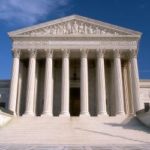This lesson provides information and activities about one American Indian Nation, the Anishinabe, called Ojibwe in Canada and Chippewa in the U.S., and engages students in research on its history, location, and past and present culture.
An Independent Judiciary: Cherokee Nation v. Georgia and Cooper v. Aaron

This documentary explores the Supreme Court cases Cherokee Nation v. Georgia (1831) and Cooper v. Aaron (1958) that defined our understanding of the role of the judiciary. In Cherokee Nation, the Supreme Court ruled it lacked the jurisdiction to review the claims of an Indian nation in the U.S. In Cooper v. Aaron, the Court affirmed that its interpretation of the Constitution was the “supreme law of the land” and that states were bound by its decisions. A PDF lesson guide is provided.
Tribal Government
This lesson examines the varied structures and functions of tribal government as well as the relationship these nations have with the United States.
Native American Cultures Across the U.S.
Teaching children about the First Americans in an accurate historical context while emphasizing their continuing presence and influence within the United States is important for developing a national and individual respect for the diverse American Indian peoples, and is necessary to understanding the history of this country.
The 19th Amendment and the Road to Universal Suffrage
In this activity, students will explore the struggle for universal suffrage long after both men and women constitutionally had the right to vote. Following a progressive timeline, primary sources highlight voting problems that arose for minority groups throughout the 20th century. Students will answer questions as they work through the documents to reflect on if and when universal suffrage was ultimately achieved.
The Reconstruction Amendments: Official Documents as Social History
The Fourteenth Amendment was the most important constitutional change in the nation’s history since the Bill of Rights. Its heart was the first section, which declared all persons born or naturalized in the United States (except Indians) to be both national and state citizens, and which prohibited the states from abridging their “privileges and immunities,” depriving any person of life, liberty, or property without due process of law, or denying them “equal protection of the laws.” Free registration for students and teachers required to access resource.